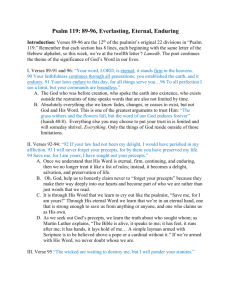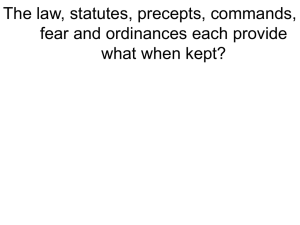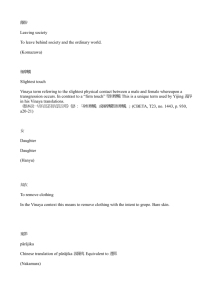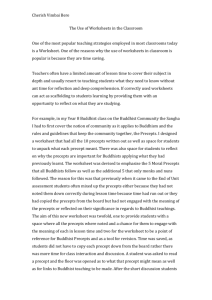The Five Precepts and Ten Good Deeds
advertisement
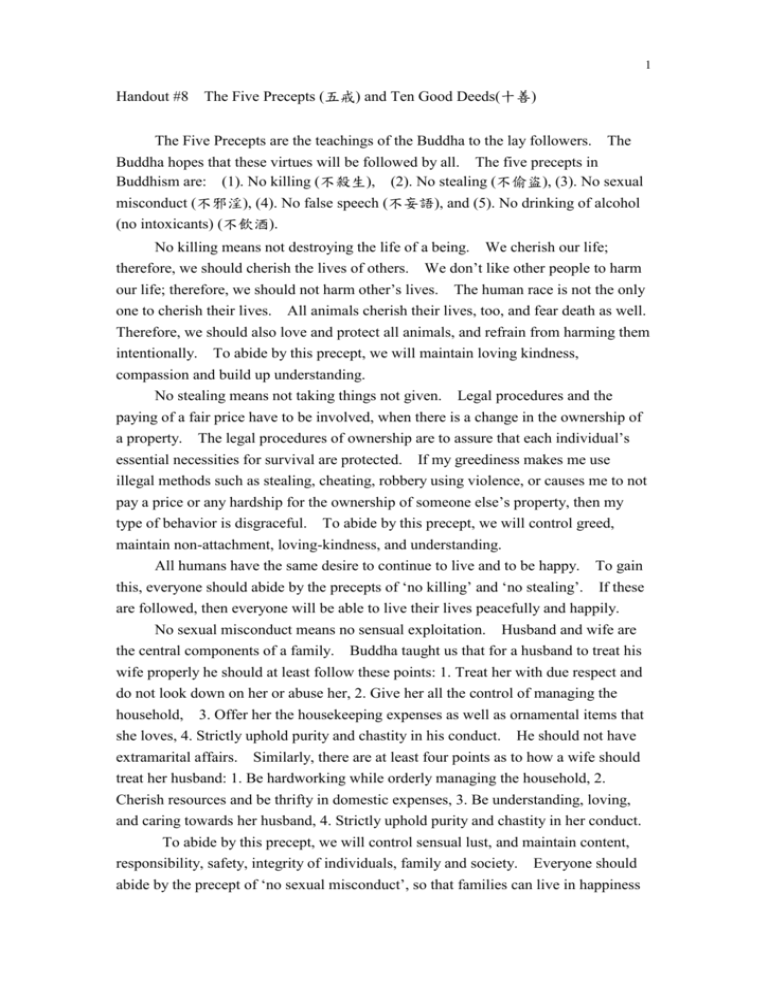
1 Handout #8 The Five Precepts (五戒) and Ten Good Deeds(十善) The Five Precepts are the teachings of the Buddha to the lay followers. The Buddha hopes that these virtues will be followed by all. The five precepts in Buddhism are: (1). No killing (不殺生), (2). No stealing (不偷盜), (3). No sexual misconduct (不邪淫), (4). No false speech (不妄語), and (5). No drinking of alcohol (no intoxicants) (不飲酒). No killing means not destroying the life of a being. We cherish our life; therefore, we should cherish the lives of others. We don’t like other people to harm our life; therefore, we should not harm other’s lives. The human race is not the only one to cherish their lives. All animals cherish their lives, too, and fear death as well. Therefore, we should also love and protect all animals, and refrain from harming them intentionally. To abide by this precept, we will maintain loving kindness, compassion and build up understanding. No stealing means not taking things not given. Legal procedures and the paying of a fair price have to be involved, when there is a change in the ownership of a property. The legal procedures of ownership are to assure that each individual’s essential necessities for survival are protected. If my greediness makes me use illegal methods such as stealing, cheating, robbery using violence, or causes me to not pay a price or any hardship for the ownership of someone else’s property, then my type of behavior is disgraceful. To abide by this precept, we will control greed, maintain non-attachment, loving-kindness, and understanding. All humans have the same desire to continue to live and to be happy. To gain this, everyone should abide by the precepts of ‘no killing’ and ‘no stealing’. If these are followed, then everyone will be able to live their lives peacefully and happily. No sexual misconduct means no sensual exploitation. Husband and wife are the central components of a family. Buddha taught us that for a husband to treat his wife properly he should at least follow these points: 1. Treat her with due respect and do not look down on her or abuse her, 2. Give her all the control of managing the household, 3. Offer her the housekeeping expenses as well as ornamental items that she loves, 4. Strictly uphold purity and chastity in his conduct. He should not have extramarital affairs. Similarly, there are at least four points as to how a wife should treat her husband: 1. Be hardworking while orderly managing the household, 2. Cherish resources and be thrifty in domestic expenses, 3. Be understanding, loving, and caring towards her husband, 4. Strictly uphold purity and chastity in her conduct. To abide by this precept, we will control sensual lust, and maintain content, responsibility, safety, integrity of individuals, family and society. Everyone should abide by the precept of ‘no sexual misconduct’, so that families can live in happiness 2 and peace. No false speech means abstaining from false speech. Societies and countries are made up of many individuals. All these individuals have to convey their feelings, thoughts, and exchange their ideas. To do so, they rely on speech. If our speech is inaccurate and dishonest, or it cannot perform the task of conveying feelings, thoughts, and exchanging ideas, it would be as if there is no bridge between the two shores. ‘No false speech’ can be categorized into four types: 1. No lying - do not speak with dishonesty and defraud others, 2. No idle speech - do not say things which will induce others to have unhealthy thoughts or actions, 3. No double talk - do not gossip or be a talebearer and arouse ill-will between two parties, which can lead to conflicts, 4. No harsh words- do not use abusive language to scold others. To abide by this precept, we should have mutual confidence and trust, mutual understanding and forgiveness, and cultivate truthfulness and mindful speech. No drinking of alcohol means not taking addictive intoxicants such as opium, morphine, liquor, etc. The precept of ‘no drinking of alcohol’- if one is caught in the bad habit of being addicted to these drugs, it will be harmful to one’s health, and one will neglect one’s work and career. In addition, as one’s mind is being anesthetized by these drugs or alcohol, one may commit evil deeds such as killing, stealing, sexual misconduct and lying. Thus, the Buddha also included this rule into the precept. To abide by this precept, we should abstain from unwholesome excitement, mindful consumption, cultivate mindfulness of good health, concern for myself, my family, and my society. The Five Precepts can be compared with the Five Virtues of Confucianism: Being humane ( benevolence,仁) means not killing and harming; being righteous (義) means not stealing; maintaining propriety (禮) means refraining from sexual misconduct; being trustworthy (faith,信) means no false speech; and being wise (intelligence,智) means refraining from drinking intoxicating liquor. Thus, the Five Precepts of Buddhism are very similar to the doctrine of Confucianism. If a person keeps the Five Precepts, then that person’s character and morality will be well grounded. If a family keeps the Five Precepts, the character and morality of its members will be in good order. If everyone in an organization, society, or nation keeps the Five Precepts, then that `body’ will certainly enjoy stability, peace, and prosperity. Some people may think that as long as they do not undertake the Five Precepts, they are exempt from the unwholesome karma associated with the violation of these precepts. This cannot be further from the truth. We only need to visit a prison to realize that all those, incarcerated for their crimes, have violated the Five Precepts in one way or another. For instance, those who have committed murder, manslaughter, 3 or aggravated assault have violated the precept against killing. Those who are guilty of corruption, misappropriation, or robbery have violated the precept against stealing. Pornography, polygamy, rape, abduction, and prostitution are all examples of violating the precept against sexual misconduct. To engage in fraud, intimidation, and defaulting on loans is to violate the precept against lying. In addition to proscribing alcohol, the precept against intoxicants also includes heroin, cocaine, and other illegal drugs, all of which damage the mind’s cognitive abilities and lead one to do unconscionable acts. If everyone upholds the Five Precepts, prisons will be empty. The Eight Precepts comprise the Five Precepts plus three more: (1) abstaining from perfume and cosmetics, (2) from singing and dancing, and (3) from sleeping in high, comfortable beds. The purpose of these three additional precepts is to practice simplicity and letting go. The Buddha introduced the Eight Precept as a skillful means to let householders have a taste of the monastic life, planting the seed of renunciation in the process. It is customary to practice the Eight Precepts on the six days of fasting1 and abstinence. The six days are the eighth, fourteenth, fifteenth, twenty-second, twenty-ninth, and thirtieth day of each month. There is no hard and fast rule which day to choose. You can choose any, all, or a combination of these days. You can also choose other days besides these six. In addition to observing the Eight Precepts, it is customary to abstain from food after noontime as a form of purification of the body. The Ten Good Deeds Among the topics of moral conduct preached by the Buddha to the lay followers are the Ten Good Deeds. This practice is more advanced than the Five Precepts. The contents of the Ten Good Deeds can be divided into three categories: Bodily action a) No killing Speech a) No lying (不誑言) Mind a) No greed (不貪) b) No stealing b) No idle talk (不綺語) b) No hatred (不瞋) c) No sexual misconduct c) No slandering (不兩舌) c) No improper views (不癡) d) No harsh speech (不惡口) The seven types of conduct mentioned above, which arises from our bodily actions and speech, are wholesome expressions that can be seen externally. These external expressions of speech and actions are initiated by the mind; thus, in order to attain ultimate wholesomeness, our minds must understand the basic moral values. This is the reason why, when comparing the Five precepts with the Ten Good Deeds, there are three extra items, which are related to mind. 4 The mental aspect of human beings is composed of three aspects: (1) the will (wish or determination 意志), (2) emotions (sentiment, feeling 感情), and (3) rationality(理智). The will of normal human beings is always boundless. One always hopes to make everything their possession. This is called greed or desire. In the aspect of emotion, people are always dissatisfied with other people, They do not forgive. They hold grudges, and they have anger towards other people. These are collectively termed as ‘hatred’. In terms of rationality, people are unable to differentiate what is right and what is wrong, what is good and what is evil. They do not understand the Law of Cause and Effect, Karma and Retribution. They are confused. This is called ignorance (improper views). The greed, hatred and ignorance in our minds are the roots of all evils. Buddha taught us methods to overcome them. In terms of the will, we need to subdue our greed and desires. In the aspect of emotion, we must learn to be kind and to forgive. With regards to rationality, one should learn to distinguish between good and evil, understand the Law of Cause and Effect, and understand the truth of all phenomena. In short, no greed, no hatred and no ignorance (improper views) are the foundation of all moral values. With a wholesome mind, one’s speech and actions are also wholesome. Through wholesome speech and actions, one strengthens the wholesomeness of one’s mind. The highest achievement in cultivating our human personality is to attain unity between our mind and external expressions of behavior, that is, the unity of understanding and actions. In this way, we attain the final goal in practicing the Buddha path, which is the attainment of Buddhahood. _______ 1 The six monthly fast days (六齋日): They are the days on which the Four Maharajas (四天王) take note of human conduct and when evil demons are busy, so that great care is required and consequently nothing should be eaten after noon. Shurangama Sutra: 阿難。修菩提者永斷五辛。是則名為第一增進修行漸次。 “Ananda, Those who cultivate for bodhi should never eat the five pungent plants. This is the first of the gradual stages of cultivation.” Commentary: 5 In cultivation, one must get rid of the causes which aid in the creation of bad karma. The five pungents, (onions, garlic, leeks, scallions, and shallots), are especially potent in increasing sexual desire, to the point that it is unbearable and one goes crazy with lust. Sutra: 云何正性。阿難。如是眾生入三摩地要先嚴持清淨戒律。 “What is the essence of karmic offenses? Ananda, beings who want to enter samadhi must first firmly uphold the pure precepts.” Commentary: The second gradual stage concerns the essence of karmic offenses (the workings of the karmic consciousness). The karmic consciousness must be transformed, and that is done by holding the precepts. One relies on the precepts in cultivation. Sutra: 永斷淫心。不食酒肉。以火淨食。無噉生氣。阿難。是修行人若不斷淫及 與殺生出三界者。無有是處。 “They must sever thoughts of lust, not partake of wine or meat, and eat cooked rather than raw foods. Ananda, if cultivators do not sever lust and killings, it will be impossible for them to transcend the triple realm.” Commentary: `Lust’ refers to deviant, improper sexual desire. One should eat pure vegetarian food. Wine and alcohol in general derange one’s nature. Once you drink alcohol, you lose your concentration and then you are likely to do just about anything. All foods should be cooked, even vegetables, because almost all raw foods will increase one’s anger. Sutra: 當觀淫欲猶如毒蛇。如見怨賊。先持聲聞四棄八棄。執身不動。後行菩薩 清淨律儀。執心不起。 “You should look upon lustful desire as upon a poisonous snake or a resentful bandit. First hold to the sound-hearer’s four or eight parajikas in order to control your physical activity; then cultivate the Bodhisattva’s pure regulations in order to control your mental activity.” Commentary: If one regarded lust as being as poisonous as that, one would not be able to take delight in it. You must keep the Shravaka precepts against killing, stealing, lust, and lying - these apply to both Bhikshus and Bhikshunis. Sutra: 禁戒成就。則於世間永無相生相殺之業。偷劫不行。無相負累。亦於世間 不還宿債。 6 “When the prohibitive precepts are successfully upheld, one will not create karma that leads to trading places in rebirth and to killing one another in this world. If one does not steal, one will not be indebted, and one will not have to pay back past debts in this world.” Commentary: `Prohibitive’ implies the practice of restraint. `Precepts’ are defined as `stopping evil and counteracting wrongdoing.’ The precepts are divided into four aspects: (1). Maintenance (持), (2). Restraint (遮), (3). Exceptions (開), and (4). Violations (犯). `Maintenance’ means upholding the precepts and cultivating in accord with them. `Restraints’ refer to prohibitions. They are honored because to violate them would contribute to further violations; as in refraining from taking intoxicants one avoids breaking other precepts as well. `Violation’ refers to breaking a precept. Sometimes exceptions are made, so that you are not considered to have violated the precept, even if you have acted against it. The following event will illustrate the aspect of exceptions. Once, when the Buddha was in the world, there were two Bhikshus cultivating in the mountains. One day, one of the Bhikshus went down the mountain to get food and left the other one sleeping. In India at that time, the Bhikshus simply wore their sashes wrapped around them; they did not wear clothing underneath. This Bhikshus had shed his robe and was sleeping nude. At that time a woman happened along, and seeing the Bhikshu, she was aroused and took advantage of him. Just as she was running away from the scene, the other Bhikshu returned from town and saw her in flight. Upon investigation he found out that the woman had taken advantage of the sleeping Bhikshu, and he decided to pursue her. He took out after her, and the woman became so reckless that she slipped off the road and tumbled down the mountain to her death. So one Bhikshu had violated the precept against sexual activity and the other had broken the precept against killing. Although the Bhikshu hadn’t actually pushed her down the mountain, she wouldn’t have fallen if he hadn’t been pursuing her. “What a mess!” concluded the two Bhikshus. Messy as it was, they had to go before the Buddha and describe their offenses. The Buddha referred them to the Venerable Upali (優婆離). But when Venerable Upali heard the details, his verdict was that, indeed, one had violated the precept against sexual activity and the other against killing, offenses which cannot be absolved. Hearing this, the two Bhikshu wept, and they went about everywhere trying to find someone who could help them. Eventually, they found the great Upasaka Vimalakirti (維摩詰), who asked why they were crying. When they had related their tale, he pronounced his judgment that they had not violated the precepts. “If you can be repentant, he said, “then I can certify 7 that you didn’t break the precepts.” “How can that be?” they asked. “The nature of offenses is basically empty.” Replied the Upasaka. “You did not violate the precepts intentionally, and so it doesn’t count. It is an exception.” Hearing this explanation by the great teacher Vimalakirti, the two Bhikshus were enlightened on the spot and were certified as attaining the fruition. So there are many explanations within the prohibitive precepts. But if people always look to the exceptions, they will simply not hold the precepts. So the Buddha did not speak much about this aspect. If one upholds the precepts, “one will not create karma that leads to trading places in rebirth and to killing one another in this world.” One is born and then kills, and the victim is reborn and kills the one who killed him. But now karmic offenses created in the cycle of mutual rebirth and mutual killing cease. The offenses of stealing will also cease when one stops stealing. I won’t take your things, and you won’t take mine. I won’t eat your flesh, and you won’t eat mine. I won’t become indebted to you, and you won’t become indebted to me. In that way we won’t have to pay each other back.
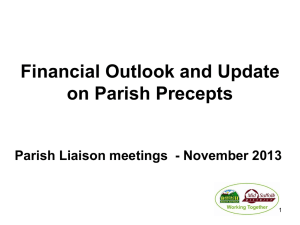
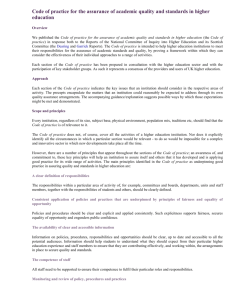
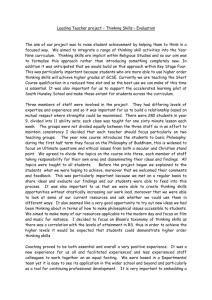
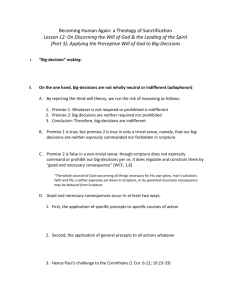
![Natural_Moral_Law_part_2[1]](http://s2.studylib.net/store/data/005436322_1-5343ff09fdfd6d3656ebca597d8369e8-300x300.png)
